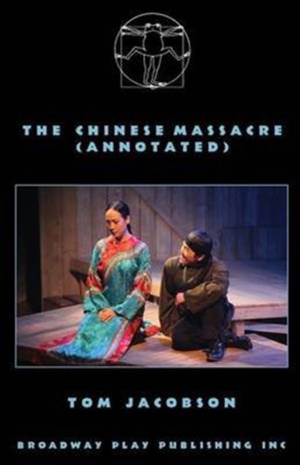
- Retrait gratuit dans votre magasin Club
- 7.000.000 titres dans notre catalogue
- Payer en toute sécurité
- Toujours un magasin près de chez vous
- Retrait gratuit dans votre magasin Club
- 7.000.0000 titres dans notre catalogue
- Payer en toute sécurité
- Toujours un magasin près de chez vous
Description
Based on historical incident, the play chronicles the first race riot in Los Angeles history: the 1871 lynching of 18 Chinese men by a mob of 500 "people from all nations." Tom Jacobson's fiercely theatrical retelling brings to light the remarkable, culturally diverse 19th-century Wild West town that exploded into the metropolis we know today. "THE CHINESE MASSACRE (ANNOTATED), Tom Jacobson's rousing new play, is like a fun day at Disneyland. Jacobson chronicles the 1871 lynching of 18 Chinese men by a mixed-race mob, historically considered to be Los Angeles's first race riot. Actors break the fourth wall by expounding on exposition and commentating on chaos, thus the 'annotated' in the title. With 14 astounding actors playing over 30 parts, the characters' contrapuntal conversations can be cacophonous, and the masterful dialects are sometimes unintelligible, but this hugely theatrical historical interpretation is an imaginative, sprawling epic that captivates and charms. With actors popping up and down like shooting gallery targets, gunfights, reenactments of the past, delicious historical tidbits, and clever, tongue-in-cheek dialogue, THE CHINESE MASSACRE (ANNOTATED) is a theatrical Frontierland - but better. You won't see mass murder, syphilis, and herb-induced abortions at the Happiest Place on Earth." -Tony Frankel, Los Angeles Theater "THE CHINESE MASSACRE manages to be emotionally moving and intellectually stimulating as well, but the emotional impact is mostly due to the sheer drama of its events rather than their presentation within Jacobson's play. This might be exactly what Jacobson intended. The (ANNOTATED) in the subtitle means that actors frequently stop the proceedings and speak from the sidelines directly to the audience, offering historical footnotes, candid confessions of the artistic license taken by the playwright, and comparisons of their own comments to the techniques employed by Brecht in his epic theater - which was designed to make spectators think about what's happening, at the expense of emotional reactions." -Don Shirley, L A Stage Times "THE CHINESE MASSACRE is a prodigiously researched, self-consciously Brechtian parable about what may be L A's first officially recorded race riot in 1871. A number of 'annotators' playfully interrupt the action to identify historical inaccuracies that have been interjected for the flow of the story - and, citing Brecht's style of epic theater, to prevent the play's larger ideas from being overpowered by our emotional reaction to various lynchings and other brutalities depicted on the stage. Those ideas swirl around the essences of ethnic bigotry that just seem to keep recycling themselves, like our race riots, as the decades roll by." -Steven Leigh Morris, L A Weekly
Spécifications
Parties prenantes
- Auteur(s) :
- Editeur:
Contenu
- Nombre de pages :
- 100
- Langue:
- Anglais
Caractéristiques
- EAN:
- 9780881455557
- Date de parution :
- 07-03-13
- Format:
- Livre broché
- Format numérique:
- Trade paperback (VS)
- Dimensions :
- 140 mm x 216 mm
- Poids :
- 127 g

Les avis
Nous publions uniquement les avis qui respectent les conditions requises. Consultez nos conditions pour les avis.






